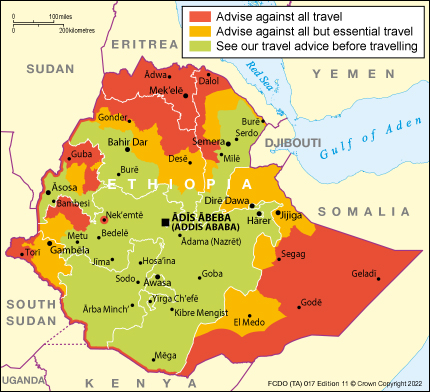Ethiopia
Summary

The Foreign, Commonwealth & Development Office (FCDO) advise against all travel to:
- the whole of Tigray regional state
- the north and northwest of Amhara regional state ( Sanja, Lay Armacho, Addi Arkay, Debark, Debat, Wegera, Belesa, Janamora and Beyeda woredas of North Gonder Zone; the whole of Wag Hemra Zone and North Wello Zone)
- the northwest of Afar regional state (Chiffra and Mile woredas of Zone 1; Dalol, Kenebo, Berahle, Aba’ala and Megale woredas of Zone 2; Yalo, Gulina and Ewa woredas of Zone 4)
- the four Woredas (Akobo, Wantawo, Jikawo and Lare) of Nuer Zone and the Jore Woreda of the Agnuak Zone in Gambella region
- the West Wollega Zone, and Nekemte town in East Wollega, in the Oromia region
- the Pawe, Guba, Dangur,Dibati, Bulen Woredas in the Benishangul Gumuz region
- the Nogob (previously Fik), Jarar (previously Degehabur), Shabelle (previously Gode), Korahe and Dollo (previously Warder) Zones of the Ethiopian Somali Region
- within 10 km of the border with South Sudan
- within 100 km of the Ethiopian border with Somalia and Kenya in the Afder and Liben Zones of Ethiopia’s Somali region
- within 10 km of the border with Sudan and the other parts of the Kenyan border, with the exception of principal roads/towns
The FCDO advise against all but essential travel to:
- all other areas of the Ethiopian Somali Region, including Siti zone, Fafan zone (with the exception of the main road and railway line to Djibouti), and the areas of Liben and Afder zones more than 100km from the Somalia and Kenya borders
- the whole of South Gonder, South Wello and Oromia Special Zones; the Metema, Chilga, Dembia and Gonder Zuria woredas of North Gonder Zone; the Rabel, Antsokiya, Efrata and Gera Midima Keya Gebriel woredas of North Shewa Zone in Amhara Regional State
- the Erabit and Afdera woredas of Zone 2; the Teru and Awra woredas of Zone 4; the Telelak, Dewe, Arturna and Fursi woredas of Zone 5; and within 10km of the border with Eritrea in Afar Regional State
- the Qellem Wollega zones, in the Oromia region
- the rest of Gambella region
- the rest of the Metekel zone of the Benishangul Gumuz region
There is a military conflict ongoing in northern Ethiopia. The conflict has potential to escalate and spread quickly and with little warning. The FCDO advises against all travel to Tigray regional state and to parts of northern Amhara and western Afar regional states. If you are in Tigray, you should leave where safe to do so. If you are in the vicinity of military activity and you cannot leave safely, you should stay indoors, away from windows and remain alert to developments that would enable you to leave safely. See Tigray Region, Amhara Region, and Afar Region.
On 15 February a nationwide State of Emergency, was lifted by the House of People’s Representatives. Those of Tigrayan or Oromo ethnicity may continue to face increased scrutiny, including at the airport and through direct police operations. You should avoid large gatherings and demonstrations. You should carry copies of ID, avoid possession of foreign currency and possession of weapons. You should avoid confrontation and follow the instructions of the authorities. You should monitor local news and social media closely for further updates. See Addis Ababa
The current political and security situation means that the consular support the British Embassy can provide may be limited. If you need urgent help, call +251 (0)11 617 0100. If you experience technical difficulties or if you are in the UK call +44 (0)20 7008 5000.
For information on returning to England from Ethiopia, see Returning to the UK.
Tensions are raised in western parts of the Southern Nations, Nationalities and Peoples Region (SNNPR) following armed clashes in Konso Zone and surrounding areas. See SNNP Region
Tensions are raised in the Benishangul-Gumuz Regional State following armed clashes in Metekel Zone. See Benishangul-Gumuz Region.
COVID-19 entry restrictions for Ethiopia
Before you travel, check the ‘Entry requirements’ section for Ethiopia’s current entry restrictions and requirements. These may change with little warning. Monitor this advice for the latest updates and stay in contact with your travel provider.
Travelling from and returning to the UK
Check what you must do to travel abroad and return to England, Scotland, Wales or Northern Ireland.
If you plan to pass through another country to return to the UK, check the travel advice for the country you’re transiting. If you will pass through a red list country, book your hotel quarantine package before travelling to the UK.
There are frequent incidences of civil unrest in Ethiopia, including protests and strikes. Some of these can cause temporary closure of roads, internet and mobile networks or disruption to local businesses and transport. In the past some protests have escalated into serious violence. See Local travel
Terrorists are likely to try to carry out attacks in Ethiopia. Attacks could be indiscriminate, including in places visited by foreigners. You should be vigilant at all times, especially in crowded areas and public places like transport hubs, hotels, restaurants, bars and places of worship and during major gatherings like religious or sporting events. There is a threat of kidnapping in Ethiopia’s Somali region, and on the southern border with Kenya, particularly in the eastern areas to which the FCDO advise against all travel. See Terrorism
Internet connections in Ethiopia, including mobile data, can be intermittent.
Ethiopia is primarily a cash based society and banking facilities, including card payments and ATMs are very limited outside major cities. See Money
There is an ongoing Ebola outbreak in the Democratic Republic of Congo. You may see some additional checks taking place at arrival on all flights into Bole Airport in Addis Ababa. See Health
The Overseas Business Risk service offers information and advice for British companies operating overseas on how to manage political, economic, and business security-related risks.